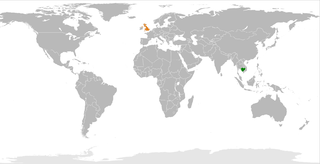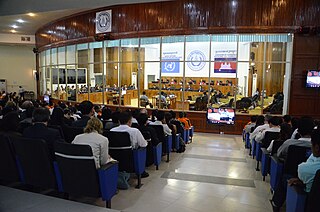Related Research Articles

The Supreme Court is the highest court in the Kingdom of Spain. Originally established pursuant to Title V of the Constitution of 1812 to replace —in all matters that affected justice— the System of Councils, and currently regulated by Title VI of the Constitution of 1978, it has original jurisdiction over cases against high-ranking officials of the Kingdom and over cases regarding illegalization of political parties. It also has ultimate appellate jurisdiction over all cases. The Court has the power of judicial review, except for the judicial revision on constitutional matters, reserved to the Constitutional Court.

The Extraordinary Chambers in the Courts of Cambodia, commonly known as the Cambodia Tribunal or Khmer Rouge Tribunal (សាលាក្ដីខ្មែរក្រហម), was a court established to try the senior leaders and the most responsible members of the Khmer Rouge for alleged violations of international law and serious crimes perpetrated during the Cambodian genocide. Although it was a national court, it was established as part of an agreement between the Royal Government of Cambodia and the United Nations, and its members included both local and foreign judges. It was considered a hybrid court, as the ECCC was created by the government in conjunction with the UN, but remained independent of them, with trials being held in Cambodia using Cambodian and international staff. The Cambodian court invited international participation in order to apply international standards.

Brenda J. Hollis is an American lawyer. She was appointed by United Nations Secretary-General Ban Ki-moon as Prosecutor of the Special Court for Sierra Leone in February 2010, replacing Stephen Rapp. Hollis was the Chief Prosecutor at the Special Court and served as the lead prosecutor in the trial and appeal of the case against Charles Taylor, the former President of Liberia. Hollis previously served as the Prosecutor of the Residual Special Court for Sierra Leone, which replaced the Special Court in December 2013; currently James Johnson, an adjunct professor at Case Western Reserve University School of Law, serves as the Chief Prosecutor for the Residual Special Court for Sierra Leone. She also serves as the Reserve International Co-Prosecutor for the Extraordinary Chambers in the Courts of Cambodia, and works as a consultant in international criminal law and procedure.
Rowan Downing,, an Australian barrister and international jurist, is a member of the international judiciary of the Extraordinary Chambers in the Courts of Cambodia.

Cambodia–United Kingdom relations refer to bilateral relations between the Kingdom of Cambodia and the United Kingdom of Great Britain and Northern Ireland. They established diplomatic relations in 1953, following Cambodia's independence from France. The UK was the first country to condemn the human rights record in Cambodia in 1978. The British embassy was opened in Phnom Penh in 1953 until March 1975, a month before the Khmer Rouge-takeover. It was reopened in 1991 following the signing of the Paris Peace Accords. Cambodia has an embassy in London.
Chung Chang-ho (Korean: 정창호) is a South Korean judge who has been serving judge at the International Criminal Court (ICC), serving since 2015. He is the second South Korean to serve in the chambers of the Court, following former president Song Sang-hyun.
Florence Ndepele Mwachande Mumba, commonly referred to as Florence Mumba, is a Zambian judge at the Extraordinary Chambers in the Courts of Cambodia, also known as the Khmer Rouge Tribunal or the Cambodia Tribunal. She has also previously served in the International Criminal Tribunal for the former Yugoslavia, the International Criminal Tribunal for Rwanda and as well as a Supreme Court Judge in Zambia.
Chandra Nihal Jayasinghe is a Sri Lankan judge and a member of the Khmer Rouge Tribunal. He is the Sri Lanka High Commissioner to the United Kingdom and was formerly a senior presiding judge of the Supreme Court of Sri Lanka and president of the Court of Appeal of Sri Lanka.
Kong Srim is a Cambodian judge and the president of the Khmer Rouge Tribunal.
Agnieszka Klonowiecka-Milart is a Polish judge and member of the United Nations Dispute Tribunal. She was formerly a judge of the Khmer Rouge Tribunal and Supreme Court of Kosovo.
Sin Rith is a Cambodian judge and reserve member of the Khmer Rouge Tribunal. He was appointed lead prosecutor of the Supreme Court of Cambodia in 2005. He has a PhD in law from Kazakhstan National University.
Ya Narin is a Cambodian judge and member of the Khmer Rouge Tribunal. He is president of the Mondulkiri Court and was formerly president of the Rattanakiri Court. He has a PhD in criminology from the State and Law Institute of Kazakhstan.
Mong Monichariya is a Cambodian judge and member of the Khmer Rouge Tribunal. He has been a judge of the Supreme Court since 2002. He studied law in Kazakhstan, and received the degree of Master of Arts in Law from Kazakhstan National University in 1993.
Motoo Noguchi is a Japanese judge and chairman of the Board of Directors of the Trust Fund for Victims at the International Criminal Court.
Huot Vuthy is a Cambodian judge and member of the Khmer Rouge Tribunal. He is a professor of law at Norton University.
Ney Thol is a Cambodian judge and member of the Khmer Rouge Tribunal. Thol was director of the School for Military Officers before being appointed president of the Military Court of Cambodia since 1987.
Baik Kang Jin is a South Korean judge and member of the Khmer Rouge Tribunal. He was formerly a judge at the Seoul High Court and a special commissioner of the Presidential Council on Intellectual Property.
The Supreme Court of Cambodia is the highest Court in the judiciary of Cambodia, under the supervision of the Supreme Council of the Magistrature. It is located in the royal capital of Phnom Penh, and is regulated under Article 55 to Article 73 of the 2014 Cambodian Law on Court Organization.
The Judiciary of Cambodia is independent from the rest of the government of Cambodia, as specified by the Cambodian Constitution. The judiciary follows civil law tradition, the instruction being entrusted to a judge and the prosecutors contenting themselves with requesting the application of the law.

An extraordinary court, or special court, is a type of court that is established outside of ordinary judiciary, composed of irregularly selected judges or applies irregular procedure for judgment. Since extraordinary court can be abused to infringe fundamental rights of individuals, contemporaly most of countries ban such courts by constitution or statutes. Usually, modern military courts judged by court-martials are regarded as examples of extraordinary courts.
References
- ↑ Supreme Court Chamber. Extraordinary Chambers in the Courts of Cambodia. Retrieved 20 April 2019.